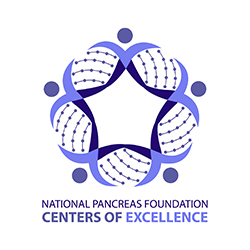Located between the stomach and spine, the pancreas is an enzyme- and hormone-making gland. When released, these enzymes and hormones aid in digestion and help you maintain a healthy blood sugar level. Pancreatic cancer occurs when pancreatic cells
Because the pancreas is deep in the abdomen, it can be difficult to diagnose pancreatic cancer. According to the American Cancer Society, approximately 60,000 Americans will get diagnosed with pancreatic cancer in 2021. Over the same period, more than 48,000 people will die of the disease.

 Pancreas Cancer at UK Markey Cancer Center
Pancreas Cancer at UK Markey Cancer Center
Using state-of-the-art technology and leading-edge medical and surgical interventions, the pancreatic cancer team provides advanced and timely pancreatic cancer diagnosis and individualized, ongoing care for patients. Each patient is cared for by a team of specialists who meet regularly to discuss individual patient cases and pancreatic cancer treatment plans. This multidisciplinary team will work with you and your doctor to coordinate a care plan designed to offer the best outcomes.
Markey has provided state-of-the-art cancer care for more than 30 years, and we are proud to be the only comprehensive cancer center in Kentucky designated by the National Cancer Institute. Since 2017, Markey Cancer Center has been nationally recognized as a top 50 cancer center by U.S. News & World Report.
Most of the time, there are no pancreatic cancer symptoms early in the disease process. However, as the cancer spreads and grows, you may experience the following symptoms:
- Appetite loss
- Back or abdominal pain
- Blood clots, which often occur in large leg veins
- Changes in blood sugar levels that can result in diabetes
- Jaundice, which causes eyes and skin to turn a yellowish color, urine to be darker than normal, skin to itch and stool to be greasy or light in color
- Nausea and vomiting
According to the American Cancer Society, the five-year relative survival rate for pancreatic cancer that has not spread from the pancreas is 39 percent. When the cancer has spread from the pancreas to nearby tissue or lymph nodes, the survival rate drops to 13 percent. When pancreatic cancer spreads throughout the body, the survival rate is 3 percent.
You can lower your risk of cancer by taking steps to build a healthy lifestyle. Here are some ways you can lower your risk for this disease, as well as improve your overall basic health:
- Avoid using tobacco products. Tobacco has been tied to multiple cancers, and it is responsible for 90 percent of lung cancer deaths.
- Stay physically active. Your physical activity is related to risk for colon and breast cancer. Excess weight gained from inactivity increases the risk of multiple cancers.
- Limit alcohol consumption. It is important to be mindful of how much alcohol you drink. Alcohol intake, even in moderate amounts, can increase the risk for colon, breast, esophageal and oropharyngeal cancer.
- Learn about screenings. Your primary care doctor can recommend appropriate cancer screenings based on your age, personal risk and family history.
- Age. After age 45, the risk for pancreatic cancer increases, and the average age of diagnosis is 70.
- Chemical exposure. Being around certain chemicals, such as those used in dry cleaning or metal working, may increase the risk.
- Diabetes. Living with Type 2 diabetes increases the risk for pancreatic cancer.
- Ethnicity. Pancreatic cancer is more common among African Americans.
- Family history. A family history of pancreatic cancer can put you at higher risk. This may be due to environmental or genetic factors.
- Obesity. Having a BMI of 30 or more boosts your risk by approximately 20 percent.
- Pancreatitis. Long-term inflammation of the pancreas (often associated with heavy smoking or drinking) raises the likelihood of pancreatic cancer.
- Sex. Pancreatic cancer affects more men than women.
- Smoking. Cigarette smoking doubles your risk for pancreatic cancer. Smoking causes approximately 25 percent of pancreatic cancers.
- For your first visit, you will be directed to the first floor of the multidisciplinary clinic within the Whitney-Hendrickson Building. Open Google Maps.
- You can register at the front desk or registration area, where a Markey team member will help guide you through your appointment.
- Several parking options are available to patients of Markey Cancer Center.
- Please remember to bring your patient packet with the completed forms. These items will help your doctor learn more about your case and determine the best plan for your care.
- To meet our patient needs, UK HealthCare accepts many forms of insurance.
Clinical trials are research studies aimed at evaluating medical, surgical or behavioral interventions to determine if a new treatment is safe and effective. At Markey, we are advancing cancer care and research to prevent, detect and treat one patient at a time. As a patient at Markey, you have a team of people looking at your individual case, applying the most recent cancer knowledge to give you the best chance of survival.
Markey has more open clinical trials than any other cancer center in the region, giving you access to some of the most advanced options available. Learn more about ongoing clinical trials for treating pancreatic cancer below.
Search Our Ongoing Clinical Trials for Pancreatic Cancer.





























